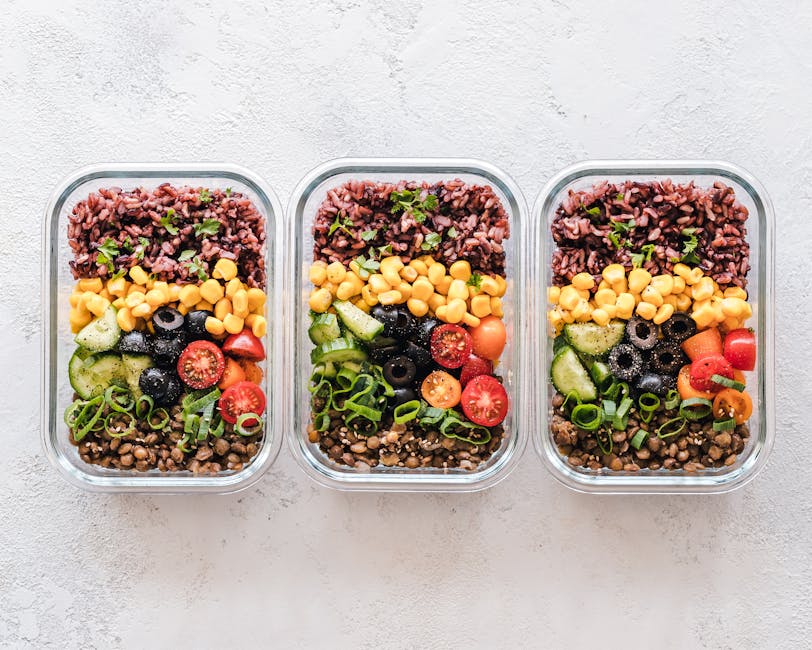How to Adopt Sustainable Eating Habits
In a world where environmental concerns are at the forefront of global discussions, adopting sustainable eating habits has become more important than ever. The way we eat not only affects our own health but also has a significant impact on the planet. From reducing greenhouse gas emissions to preserving biodiversity, sustainable eating practices can help create a healthier and more sustainable future for generations to come.
But what exactly does it mean to eat sustainably? How can individuals make conscious choices that benefit both themselves and the environment? In this comprehensive guide, we will explore the various aspects of sustainable eating, from understanding the principles behind it to implementing practical strategies in your daily life. Let’s delve into the world of sustainable eating habits and discover how small changes can lead to big impacts.
The Principles of Sustainable Eating

Sustainable eating is based on the idea of consuming food in a way that supports long-term ecological balance. It involves making choices that promote the health of the planet, as well as the well-being of individuals and communities. Here are some key principles of sustainable eating:
1. Locally Sourced Foods
One of the fundamental principles of sustainable eating is choosing locally sourced foods whenever possible. By supporting local farmers and producers, you reduce the carbon footprint associated with transporting food long distances. Additionally, locally sourced foods are often fresher and more nutritious, as they are harvested at peak ripeness.
For example, purchasing fruits and vegetables from a farmer’s market in your community not only supports small-scale farmers but also allows you to enjoy seasonal produce that is grown in your region. By opting for locally sourced foods, you can significantly reduce the environmental impact of your diet.
2. Organic and Sustainable Agriculture
Another important aspect of sustainable eating is choosing organic and sustainably grown foods. Organic farming practices eliminate the use of synthetic pesticides and fertilizers, which can be harmful to the environment and human health. Sustainable agriculture focuses on preserving soil health, conserving water resources, and promoting biodiversity.
When shopping for groceries, look for organic certifications and labels that indicate the food has been produced using environmentally friendly practices. By supporting organic and sustainable agriculture, you can contribute to the protection of ecosystems and the promotion of sustainable food production methods.
3. Plant-Based Diet
Transitioning to a plant-based diet is a powerful way to promote sustainability in your eating habits. Plant-based foods require fewer resources to produce compared to animal products, making them more environmentally friendly. By incorporating a variety of fruits, vegetables, legumes, and whole grains into your diet, you can reduce your carbon footprint and support sustainable food systems.
Plant-based diets have also been linked to numerous health benefits, including lower rates of chronic diseases such as heart disease and diabetes. By prioritizing plant-based foods in your meals, you can improve your health while reducing the environmental impact of your diet.
Reducing Food Waste

Food waste is a significant issue that contributes to environmental degradation and resource depletion. In the United States alone, it is estimated that up to 40% of food is wasted each year. By taking steps to reduce food waste in your own home, you can minimize your impact on the environment and save money in the process.
1. Meal Planning
One effective way to reduce food waste is through meal planning. By creating a weekly meal plan and shopping list, you can avoid buying excess food that may end up going to waste. Plan your meals based on ingredients you already have at home and prioritize using perishable items before they spoil.
Meal planning not only helps you save time and money but also allows you to make more intentional choices about the foods you consume. By reducing food waste, you can contribute to a more sustainable food system and minimize your environmental impact.
2. Proper Storage
Properly storing food can help extend its shelf life and prevent spoilage. Make sure to store fruits and vegetables in the refrigerator or in a cool, dark place to maintain freshness. Use airtight containers to store leftovers and avoid letting food go to waste due to improper storage.
By taking simple steps to store food properly, you can reduce the amount of food that ends up in the trash. This not only benefits the environment but also helps you get the most out of the food you purchase.
The Impact of Sustainable Eating

Adopting sustainable eating habits can have a profound impact on both the environment and human health. By making conscious choices about the foods we consume, we can contribute to a more sustainable food system and create a healthier future for ourselves and the planet.
Environmental Benefits
One of the primary benefits of sustainable eating is its positive impact on the environment. By choosing locally sourced, organic, and plant-based foods, we can reduce greenhouse gas emissions, conserve water resources, and protect biodiversity. Sustainable agriculture practices help preserve soil health and promote ecosystem resilience, contributing to a more sustainable future for all.
Additionally, by reducing food waste and making more intentional choices about our consumption habits, we can further minimize our environmental footprint. Every small change we make in our eating habits can have a ripple effect on the health of the planet, creating a more sustainable and resilient food system for future generations.
Health Benefits
In addition to its environmental benefits, sustainable eating can also have a positive impact on human health. Plant-based diets have been associated with lower rates of chronic diseases such as heart disease, diabetes, and certain types of cancer. By prioritizing whole, unprocessed foods in our diets, we can improve our overall health and well-being.
Choosing organic and sustainably grown foods can also reduce our exposure to harmful pesticides and chemicals, promoting better health outcomes. By focusing on nutrient-dense foods that nourish our bodies and support our immune systems, we can enhance our quality of life and reduce the risk of diet-related illnesses.
Social and Economic Benefits
Sustainable eating practices can also have positive social and economic impacts. By supporting local farmers and producers, we can strengthen local food systems and promote community resilience. Buying locally sourced foods helps create jobs and economic opportunities in our communities, contributing to a more sustainable and equitable food system.
Additionally, by prioritizing fair trade and ethical food production practices, we can support farmers and workers around the world who are often vulnerable to exploitation. By choosing foods that are produced in a socially responsible manner, we can help create a more just and sustainable food system for all.
Common Misconceptions about Sustainable Eating

Despite the growing awareness of sustainable eating practices, there are still some common misconceptions that may prevent individuals from adopting more sustainable habits. Let’s debunk some of these myths and clarify the reality behind sustainable eating:
1. Sustainable Eating is Expensive
One of the most common misconceptions about sustainable eating is that it is expensive and inaccessible to the average consumer. While some organic and locally sourced foods may have a higher price point, there are many ways to eat sustainably on a budget. By focusing on seasonal produce, shopping at farmer’s markets, and buying in bulk, you can reduce your grocery bill while supporting sustainable food practices.
Additionally, growing your own fruits and vegetables or joining a community-supported agriculture (CSA) program can be cost-effective ways to access fresh, locally grown foods. By being strategic about your food choices and prioritizing quality over quantity, you can eat sustainably without breaking the bank.
2. Sustainable Eating is Restrictive
Another common misconception is that sustainable eating is restrictive and requires giving up your favorite foods. In reality, sustainable eating is about making conscious choices that align with your values and priorities. You don’t have to completely eliminate certain foods from your diet to eat sustainably; instead, focus on incorporating more plant-based options and choosing foods that are produced in an ethical and environmentally friendly manner.
By experimenting with new recipes, trying different ingredients, and exploring alternative sources of protein, you can discover a world of delicious and sustainable foods that nourish your body and support the planet. Sustainable eating is about balance, not deprivation, and can be tailored to fit your individual preferences and dietary needs.
Conclusion
In conclusion, adopting sustainable eating habits is a powerful way to promote the health of both individuals and the planet. By choosing locally sourced, organic, and plant-based foods, reducing food waste, and supporting ethical food production practices, we can create a more sustainable and resilient food system for future generations.
Every small change we make in our eating habits has the potential to make a big impact on the environment, human health, and society as a whole. By prioritizing sustainability in our food choices, we can contribute to a healthier, more equitable, and more sustainable world for all.
So, why not take the first step towards a more sustainable future today? Whether it’s starting a small vegetable garden, shopping at your local farmer’s market, or trying a plant-based recipe, every choice you make can help shape a better tomorrow. Let’s embrace the power of sustainable eating and work together towards a healthier, more sustainable world for generations to come.




